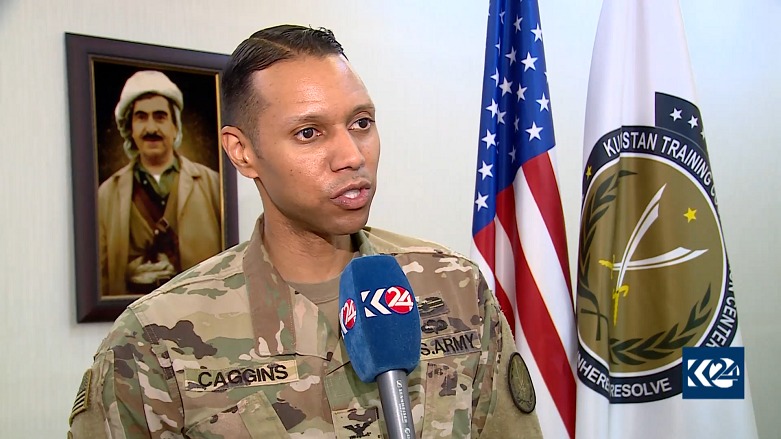Coalition continues to support the repatriation of foreign ISIS fighters not local prosecution in Syria: Spokesman

ERBIL (Kurdistan 24) – The spokesman for the US-led coalition denied a report by the British-based war monitor, Syrian Observatory for Human Rights (SOHR), that it had plans to support the local authorities in Syria’s northeast set up an international court.
On Tuesday, SOHR claimed a hall was constructed in Qamishli to serve as an international court with full support from the US-led coalition, including France and the United States. The building would allegedly serve as a court to put foreign Islamic State fighters on trial.
Col. Myles B. Caggins III, Spokesman for the US-led coalition, formally known as Combined Joint Task Force-Operation Resolve (CJTF-OIR), told Kurdistan 24 that those reports are false.
“The Coalition maintains the best disposition option for these foreign ISIS detainees would be for their home countries to repatriate, prosecute, and, where appropriate, incarcerate them,” he said.
“Those who have broken the laws of their country of origin through their support for ISIS or its affiliates should be subject to criminal prosecution or other judicial processes in their home country.”
The Autonomous Administration of North and East Syria (AANES) have said they would prepare local trials this year for foreign members of the so-called Islamic State who are in northeast Syria because many European countries have refused to repatriate their nationals.
Some governments in Europe, however, have returned many children, mostly orphans of Islamic State-affiliated families. These countries include France and the Netherlands in June 2019.
Abdulkarim Omar, the co-chair of the Foreign Relations Bureau of the Autonomous Administration, said at a press conference in February that trials would begin in March 2020.
The AANES and officials from the Syrian Democratic Council (SDC) visited Europe in February but gained limited support. As such, no trials began in March.
Thomas McClure, a Syria-based researcher at the Rojava Information Center, told Kurdistan 24 that most concrete offers of support for the legal process did not materialize because many state actors indicated they would neither block the AANES’ plans nor provide material support.
Nevertheless, the Autonomous Administration of North and East Syria still plans to “set up a new court to try international ISIS suspects, in parallel with the local courts, which have tried thousands of Syrian ISIS suspects to date,” he added.
McClure also noted that the search for international support for the establishment of a court to try foreign Islamic State fighters in northeastern Syria was always bound to take time “even before coronavirus.”
The worldwide COVID-19 pandemic has halted plans by European nations to repatriate its nationals. Although French authorities did repatriate a seriously-ill 7-year-old French national on April 22.
The Kurdish-led Syrian Democratic Forces (SDF) continue to hold over 14,000 captured suspected Islamic State fighters, including 2,000 foreign nationals, 800 of which are Europeans.
Guarding these inmates has been a challenge, with two attempted jailbreaks in recent months – on May 3 and March 29 – at two separate prisons in Hasakah city.
There are also nearly 13,500 foreign women with suspected ties to the Islamic State and their children at camps for displaced civilians in the Hasakah province.
Editing by Karzan Sulaivany
